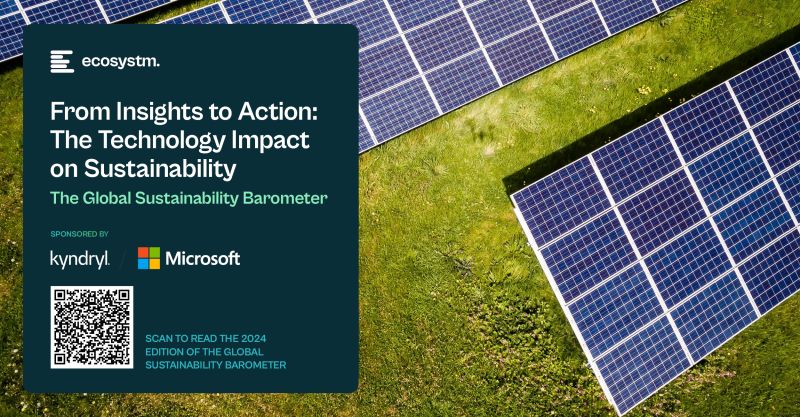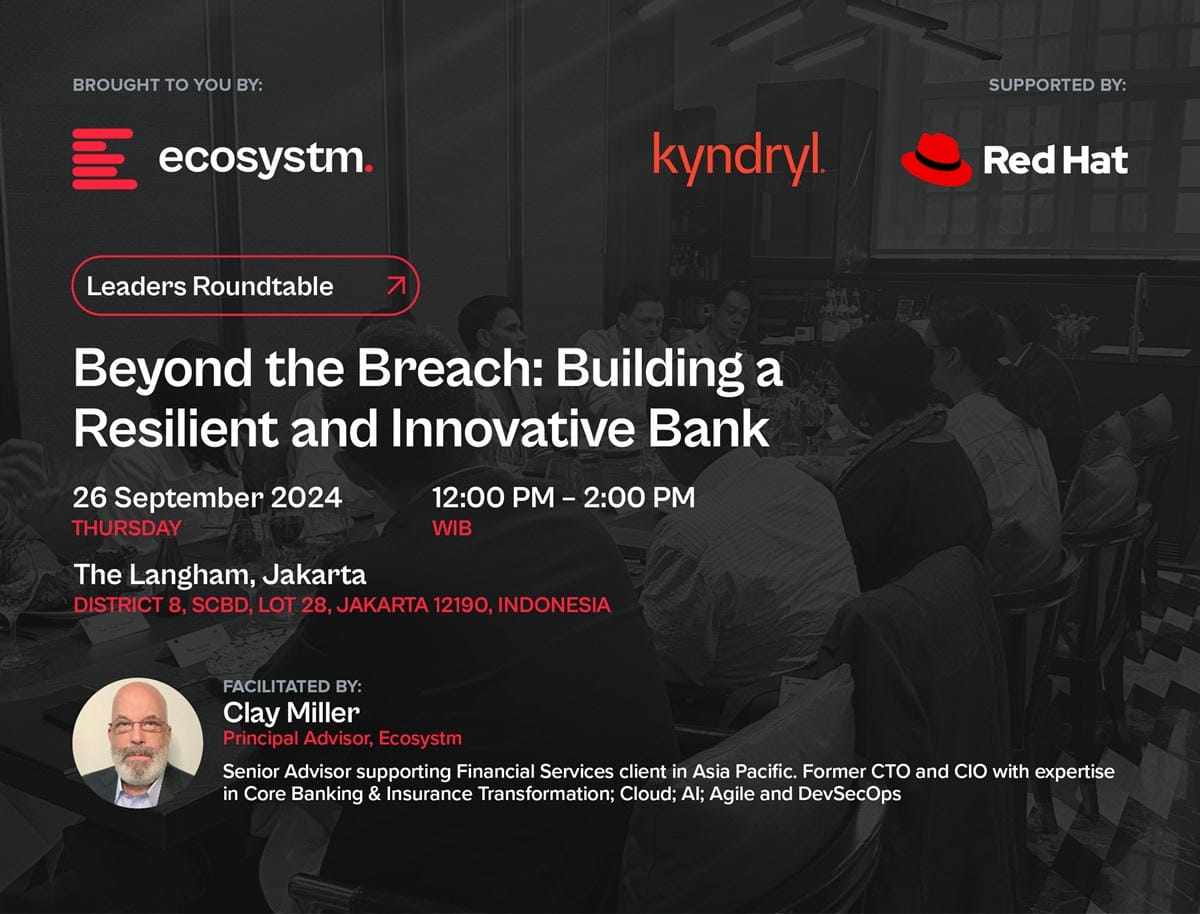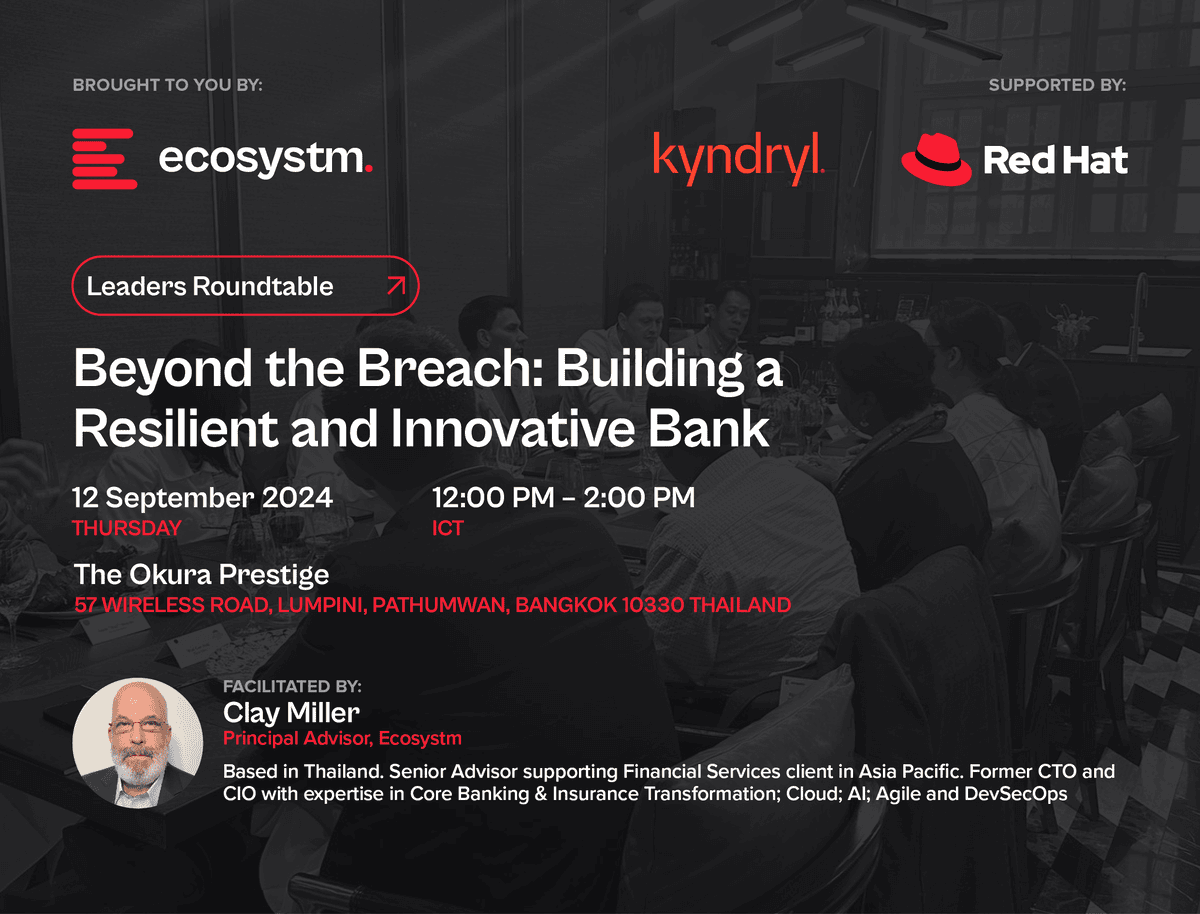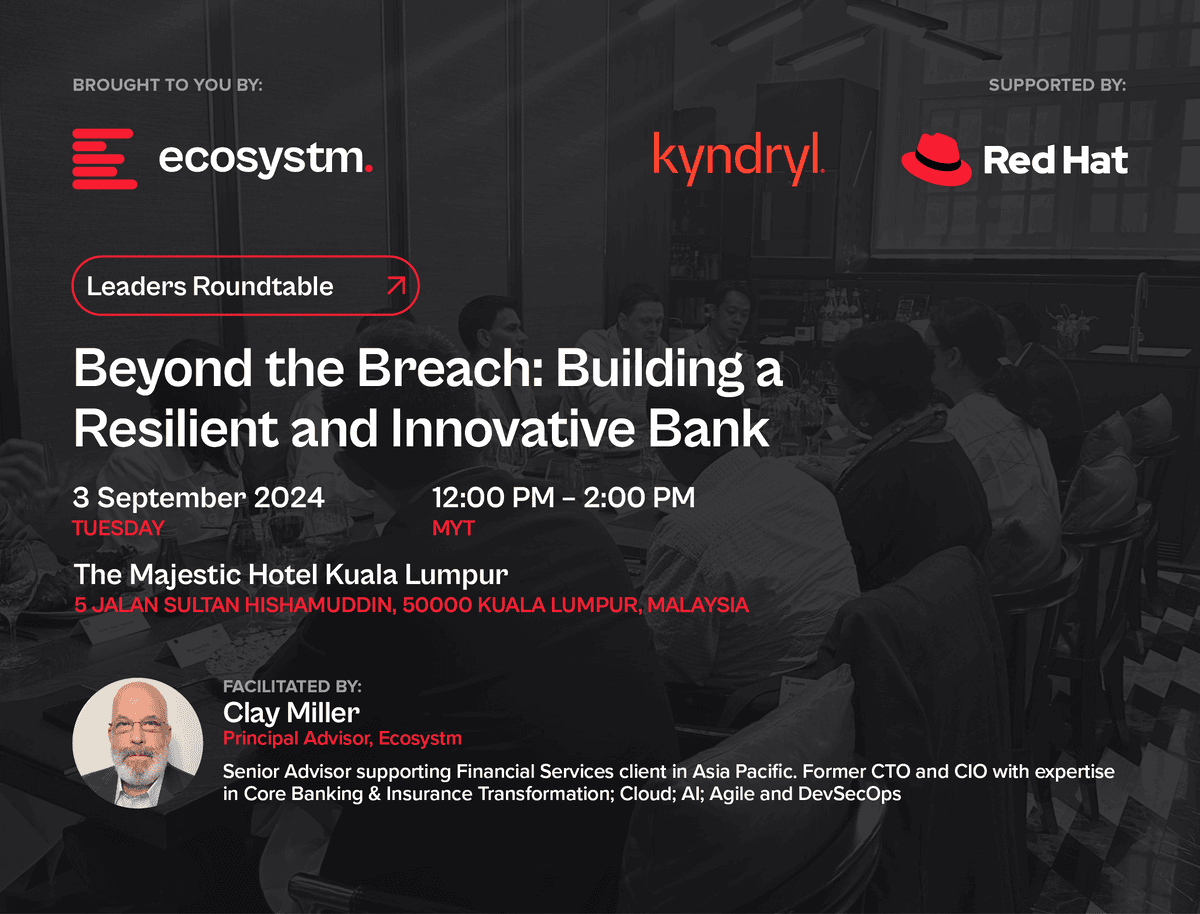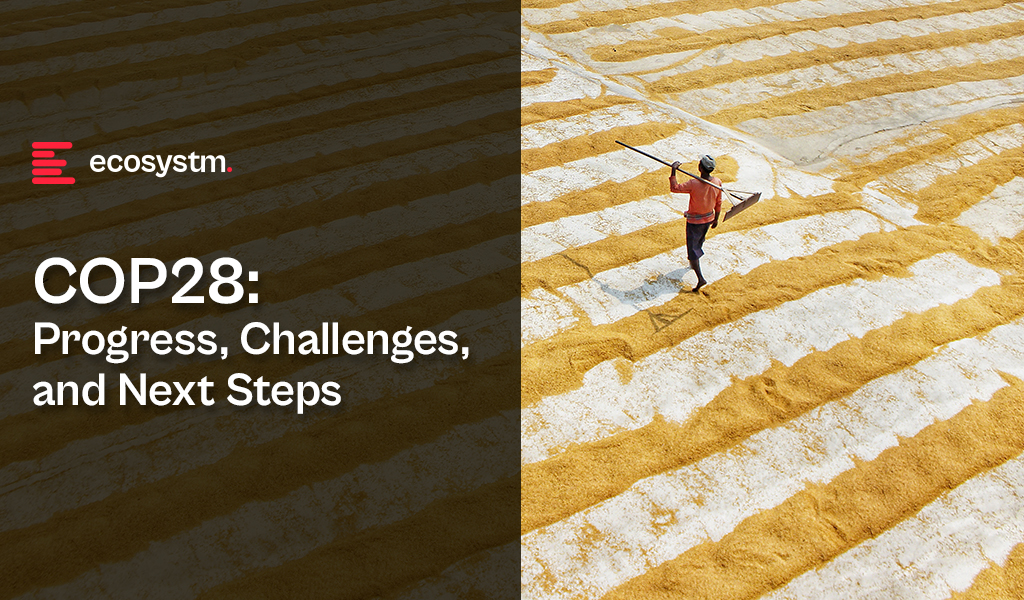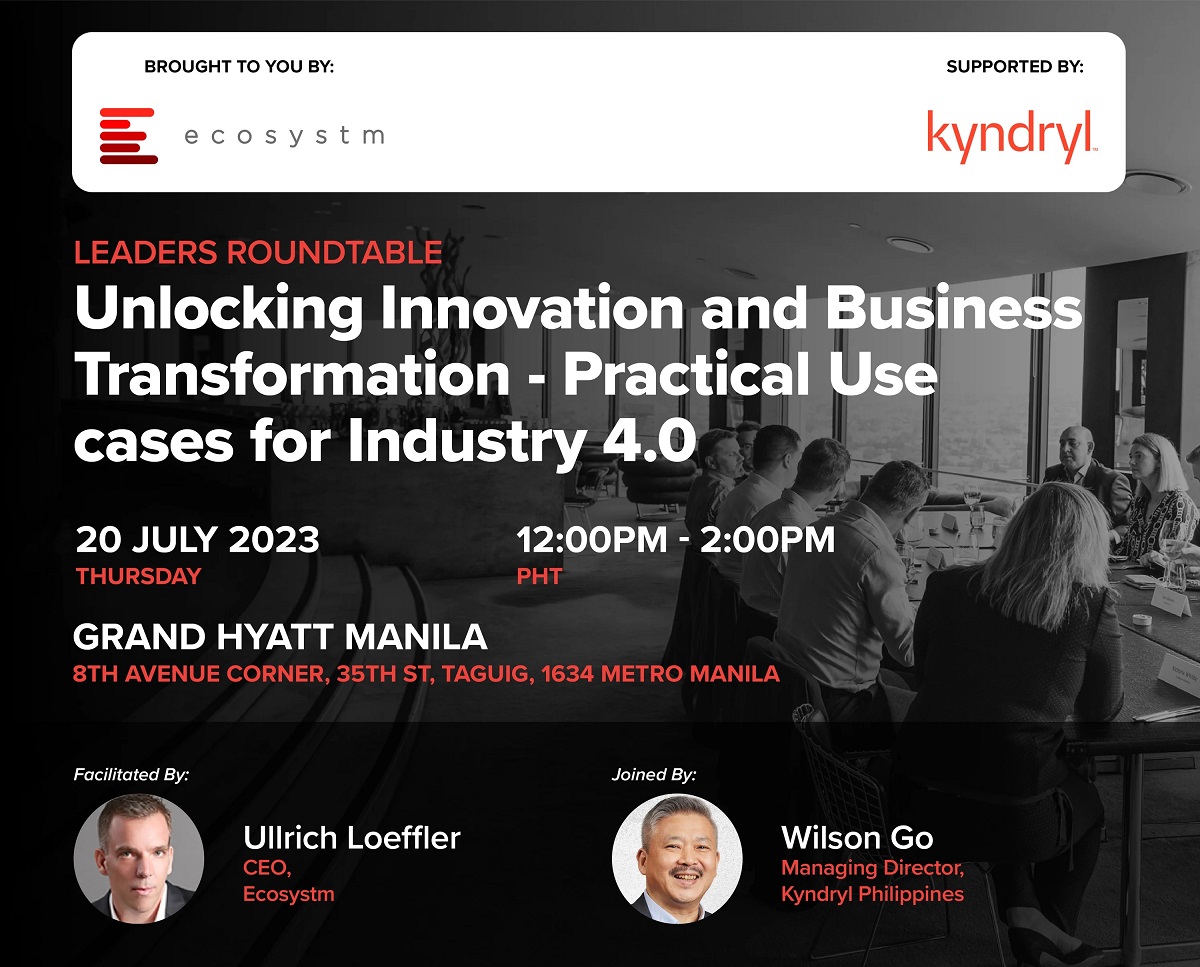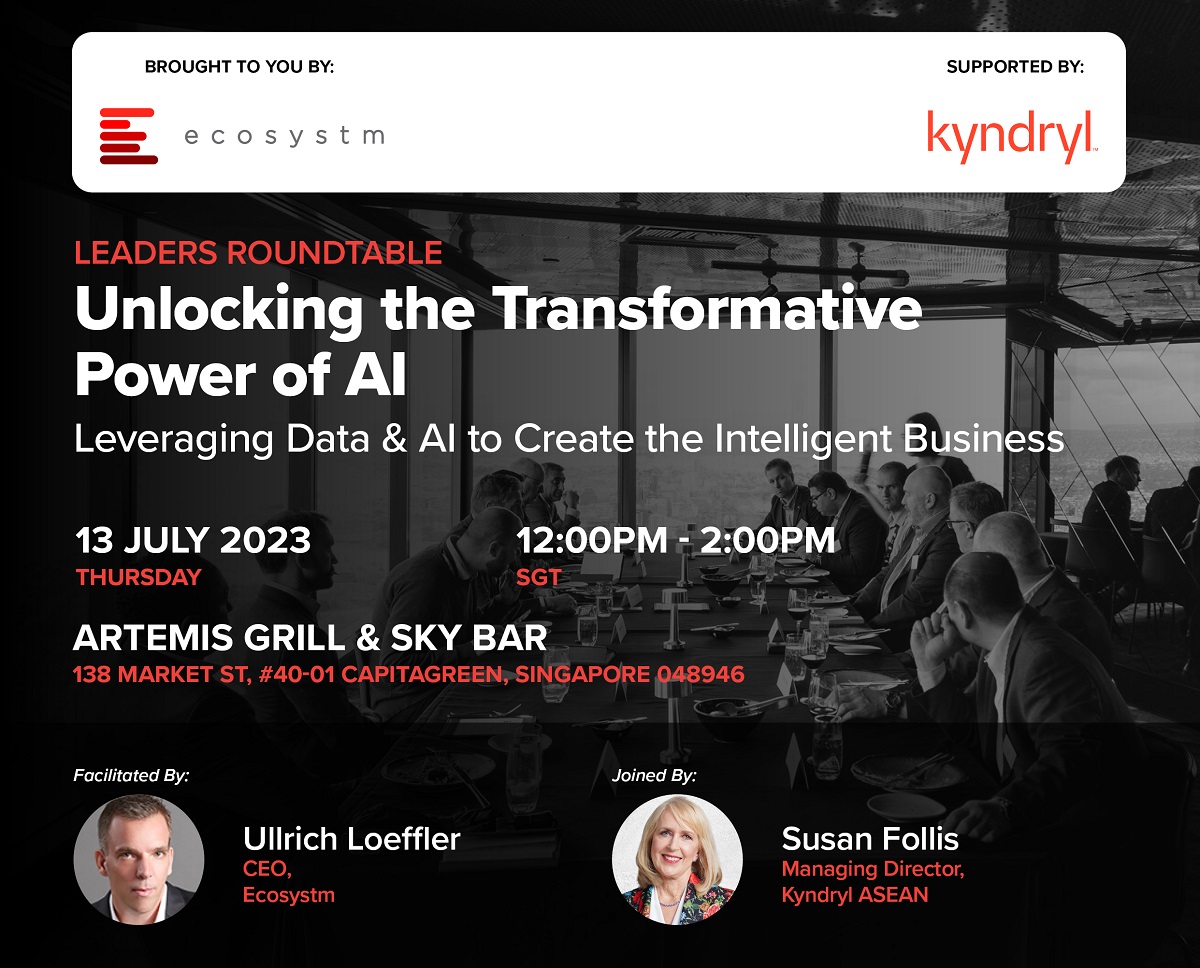As increasing climate chaos creates a disruptive impact on businesses, climate crisis, resource scarcity and environmental destruction are no longer just news stories — they are daily realities affecting all of us. Despite numerous sustainability initiatives, progress is not happening fast enough to meet the demands of a growing population and a rapidly changing planet.
The second edition of The Global Sustainability Barometer study, commissioned by Kyndryl and Microsoft, examines the roles that strategy, data and AI play in achieving sustainability goals and highlights the gaps between organizational intent and action.
Conducted by Ecosystm in August and September of 2024, this study reflects the perspectives of 1,355 global sustainability leaders spanning 20 countries and nine industries. Respondents were evenly split between technology leaders and sustainability leaders from various business lines.
Download Whitepaper – 2024 Global Sustainability Barometer Study

(Clicking on this link will take you to the Kyndryl website where you can download the whitepaper)

Leaders Roundtable: Beyond the Breach: Building a Resilient and Innovative Bank
We’ve concluded another successful event! Thanks to everyone for their Valuable contributions.
->Click here to explore hightlights and key takeaways from this Roundtable session.
Leaders Roundtable: Beyond the Breach: Building a Resilient and Innovative Bank
We’ve concluded another successful event! Thanks to everyone for their Valuable contributions.
->Click here to explore hightlights and key takeaways from this Roundtable session.
Leaders Roundtable: Beyond the Breach: Building a Resilient and Innovative Bank
We’ve concluded another successful event! Thanks to everyone for their Valuable contributions.
->Click here to explore hightlights and key takeaways from this Roundtable session.
Leaders Roundtable: Beyond the Breach: Building a Resilient and Innovative Bank
We’ve concluded another successful event! Thanks to everyone for their Valuable contributions.
->Click here to explore hightlights and key takeaways from this Roundtable session.
The 28th United Nations Climate Change Conference (or COP28) took place at the end of 2023 in one of the most climate-vulnerable countries in the world – the UAE. The event brought together nations, leaders, and climate experts to unite around tangible climate action and deliver realistic solutions.
COP28 marked a watershed moment in the global effort to fight climate change because it concluded the first Global Stocktake – a routine assessment of progress under the Paris Agreement that occurs every five years. It is clear that we are not on track to meet the agreement’s goals, but the decisions and actions taken during COP28 can redefine the trajectory of climate action.
COP27: Laying the Foundation
COP27 laid the groundwork for this year’s conference. The summit focused on mitigation, adaptation, finance, and collaboration. The key outcomes of COP27 included the creation of the loss and damage fund, new pledges to the Adaptation Fund, and advancements in the Santiago Network focused on technical support for climate-affected regions. The conference also saw progress on the Global Stocktake and formal recognition of new issues such as water, food security, and forests within climate deliberations.
However, there was widespread criticism for failing to live up to the urgency of impending climate crisis. Despite being called the “implementation COP”, nothing decisive was done to ensure global warming is limited to 1.5 degrees celsius.
COP28: Milestones
Launching the first-ever Global Stocktake. The Global Stocktake was the spotlight of this year’s event and covered various climate issues, including energy, transport, and nature. Despite strong opposition from Oil & Gas interests, negotiators secured an agreement indicating the start of the end of the fossil fuel era – a much-needed conclusion to the hottest year in history. The next global assessment of Paris Agreement targets is expected to take place at COP33 in 2028.
Supporting sustainable agriculture. A landmark declaration on sustainable agriculture was adopted to address climate-related threats to global food systems. Signed by 160 countries, the declaration pledged a collective commitment by participating nations to expedite the integration of agriculture and food systems into national climate actions by 2025. For the first time ever, the summit also featured an entire day devoted to food and agriculture and saw a food systems roadmap laid out by the Food and Agriculture Organisation (FAO).
Operationalising the “Loss and Damage” fund. The conference saw the approval of the “loss and damage fund” that was first tabled at COP27 last year. The fund has been a long-requested support for developing nations facing the impact of climate change.
Tripling renewables and doubling energy efficiency by 2030. 118 countries signed a renewable energy pledge to triple the world’s green energy capacity to 11,000 GW by 2030, reducing the reliance on fossil fuels in generating energy. The pledge is expected to see global average annual rate of energy efficiency improvements from around 2% to over 4% every year until 2030. While the pledge spearheaded by the EU, the US, and the UAE is not legally binding, it is a step in the right direction.
Adapting to a warmer world. COP28 provided a framework for the ‘Global Goal on Adaptation’ to guide countries in their efforts to protect their people and ecosystems from climate change. An explicit 2030 date has been integrated into the text for targets on water security, ecosystem restoration, health, climate-resilient food systems, resilient human settlements, reduction of poverty, and protection of tangible cultural heritage.
Addressing methane. Methane took centre stage at COP28, reflecting its significant role in current global warming. US, Canada, Brazil, and Egypt announced more than USD 1 billion in funding to reduce methane emissions. Despite facing political challenges, these measures signify a shift towards concrete regulatory and pricing tools, marking a step forward in addressing methane’s impact on climate protection.
How COP28 Could Have Been More Impactful
Better funding allocations. Although the “loss and damage” funding agreement seems like a major outcome, the actual financial commitments fell far short. US and China, despite being the world’s largest emitters, extended only USD 17.5 million and USD 10 million to the fund, respectively. There is also debate about how funds should be distributed, with mature countries favouring aid allocation based on vulnerability. This approach might exclude middle-income countries that have suffered significant climate-related damage recently.
More focus on AI. While COP28 tackled critical climate issues, it overlooked a significant concern – the environmental impact of AI. While AI holds promise for improved sustainability, it is important to address the environmental consequences of AI model training and deployment. The absence of scrutiny on the ecological impact of AI represents a missed early opportunity, considering the widespread hype and significant investments in the technology.
Recognising climate refugees. The increase in climate-related displacement is a growing concern, with millions already affected and predictions of a significant rise by 2050. International law does not recognise those displaced by climate events as refugees. Despite this, the topic wasn’t adequately explored at COP28, highlighting the need for inclusive discussions and solutions for safe migration pathways.
A Call for Unified Action
While COP28 and similar forums highlight the severity of the climate crisis, the real power lies in continuous collective conversations that identify gaps, strive to bridge them, and drive meaningful change. Ecosystm, in collaboration with partners Kyndryl and Microsoft, conducted a Global Sustainability Barometer study, that reveals that while 85% of global organisations acknowledge the strategic importance of sustainability goals, only 16% have successfully integrated sustainability into their corporate and transformation strategies with tangible data.
While governments and policy makers continue to focus on building a sustainable future for the planet, this is time for a shift in mindset and action is pivotal for a unified global effort in addressing climate challenges and building a sustainable future – from organisations and individuals alike.



